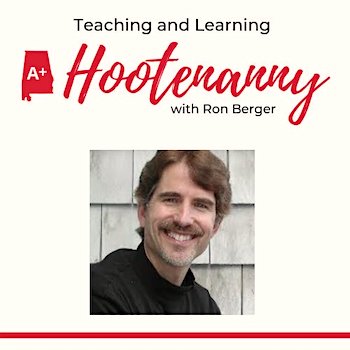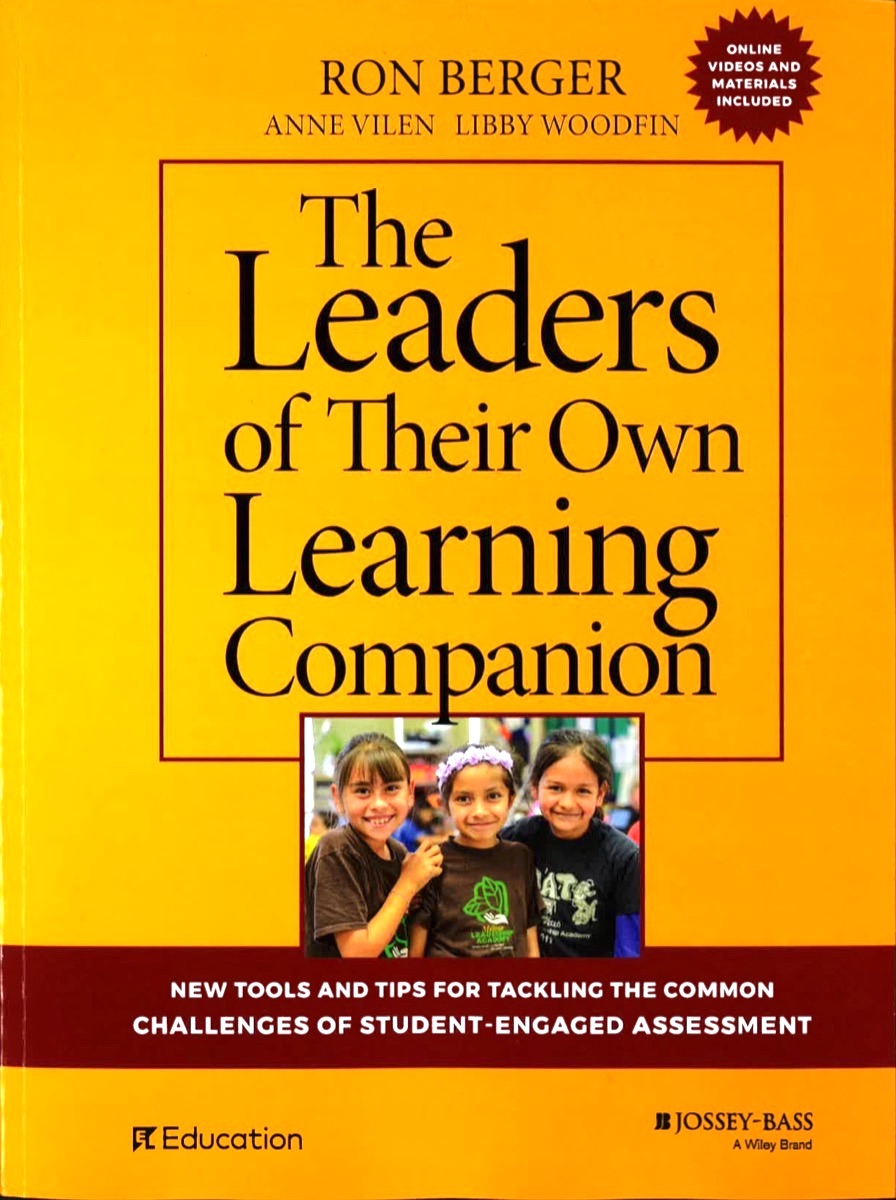 This post tells the story of how I came to write my first Foreword for a book, and how many of us became believers in the idea that students can be leaders of their own learning.
This post tells the story of how I came to write my first Foreword for a book, and how many of us became believers in the idea that students can be leaders of their own learning.
Let’s face it. Students are volunteers. Yes, you can require them to be in school. And, you may be able to expect compliance. But only they can decide whether they want to learn.
That’s where Leaders of Their Own Learning comes in. Authors Ron Berger, Leah Rugen and Libby Woodfin in 2014 introduced readers to student-engaged assessment in this groundbreaking book.
Student-engaged assessment involves students in understanding and investing in their own growth. It changes the primary role of assessment from evaluating and ranking students to motivating them to learn. It empowers students with the understanding of where they need to go as learners and how to get there. It builds the independence, critical thinking skills, perseverance, and self-reflective understanding that students need for college and careers…(p. 4)
After reading LOTOL (as we’ve come to call it), I was convinced that it could help provide the pathway for Alabama teachers to better engage their students and ensure that they are learning at high levels. We adopted the book as a guiding text for our statewide school network, The Powerful Conversations Network (PCN), and used it for two years with great success.
One of the “Big Ideas” in LOTOL is the “learning target.” As a former student in an EL Education supported school put it:
The seemingly simple work of reframing objectives written for teachers to learning targets, written for—and owned by—students, turns assessment on its head. The student becomes the main actor in assessing and improving his or her learning. (Source)
In our PCN member schools, as teachers began to explore student-engaged assessment, we started to see learning targets becoming more than classsroom wallpaper. Teachers learned that they needed to ensure students understood what it was they were supposed to learn, and they began to reference the learning target(s) several times during the lesson. They also checked in with students to ensure that they understood the desired learning. And, during our ABPC instructional rounds in these schools, students could tell you WHAT they were learning and WHY they were learning it!
Checking for Understanding and Data Notebooks
Two critical components of student-engaged assessments help students monitor their own learning. Throughout LOTOL, the authors offer examples of in-the-moment checks for understanding, along with any formative assessments embedded in the lesson. Additionally, to help them track their own progress, students use data. (Weeden Elementary in Florence was one of the first schools in Alabama to embrace data notebooks. Read about their use and its impact in this post.)
But We Needed More
Time passed, and as we listened to teachers and administrators discuss their journey to adopt student-engaged assessment, we learned they wanted more. The wonderful videos included with Leaders of Their Own Learning helped, as did the examples of tools teachers and students could use. But, we kept hearing, “what if?”
- What if students don’t understand the learning target?
- What if teachers don’t have time to embed checks for understanding?
- What if . . .
A New Toolkit
So I was delighted to learn that a companion guide to Leaders of Their Own Learning was in the works. One of the authors, Libby Woodfin, called to ask if some Alabama educators would preview the first two chapters – on learning targets and checking for understanding – and comment on the clarity and practicality of the content.
Teachers from Florence and Pike Road agreed to do exactly that and provided valuable feedback to the authors. They also wanted to know when this new resource would be available, because they instantly understood its value!
Celebrating ABPC’s 20th Year
 Because of the tremendous impact of Leaders of Their Own Learning on learning in Alabama schools, we decided to ask Ron Berger, the Chief Academic Officer of EL Education, to join our 20th anniversary ABPC “Hootenanny” celebration and share his insights about student-engaged assessment. It was during his visit to Camp McDowell this past January that Ron asked me to write the Foreword to the LOTOL companion volume.
Because of the tremendous impact of Leaders of Their Own Learning on learning in Alabama schools, we decided to ask Ron Berger, the Chief Academic Officer of EL Education, to join our 20th anniversary ABPC “Hootenanny” celebration and share his insights about student-engaged assessment. It was during his visit to Camp McDowell this past January that Ron asked me to write the Foreword to the LOTOL companion volume.
What a perfect opportunity to highlight all the wonderful things that Alabama educators are doing to engage their students in high levels of learning! I agreed to write the Foreword if it could feature some of our Alabama educators’ many successes.
In addition to Weeden Elementary in Florence, Isabella HS in Chilton County, Rock Quarry Elementary in Tuscaloosa City, Pike Road Elementary, and the schools in Athens and Oxford are all mentioned. I wish we’d had room for more. I could have written an entire book about all of the good things going on in Alabama classrooms using student-engaged assessment.
Check out the Book – It’s a Powerful Resource!
As I wrote in the Foreword, I love the way the chapters are organized and worded in The Leaders of Their Own Learning Companion. After a brief definition of the specific student-engaged assessment component, each chapter identifies learning targets related to that component. Also embedded in each chapter are common dilemmas and detailed suggestions for addressing them. (For an enticing overview of what’s in the book, download this file from the publisher. You’ll be amazed.)
The wording is clear and personal and puts the reader at ease. Then comes my favorite part: Each of the challenges is accompanied by a “Try This” section that offers suggestions about how to work through the challenge. It’s like a virtual “help desk” available whenever a teacher needs it. You can be sure that we will use this valuable resource and encourage its spread within our networks. That certainly will not be a challenge. The teachers who previewed the manuscript have been clamoring for this Companion guide ever since!
It’s Not Just About School, It’s About Life
One of the things I most appreciate about EL Education is their commitment to helping educators develop good people. Ron, Libby, and others understand student-engaged assessment is not only about content knowledge and academic skills. It’s about character development and nurturing a love of learning that lasts a lifetime. This new addition to the EL Education library will be another valuable resource for educators as they help students find the path that leads to self-assurance and self-worth.


0 Comments on "ABPC’s Cathy Gassenheimer Writes the Foreword for a Valuable New Resource, The Leaders of Their Own Learning Companion"